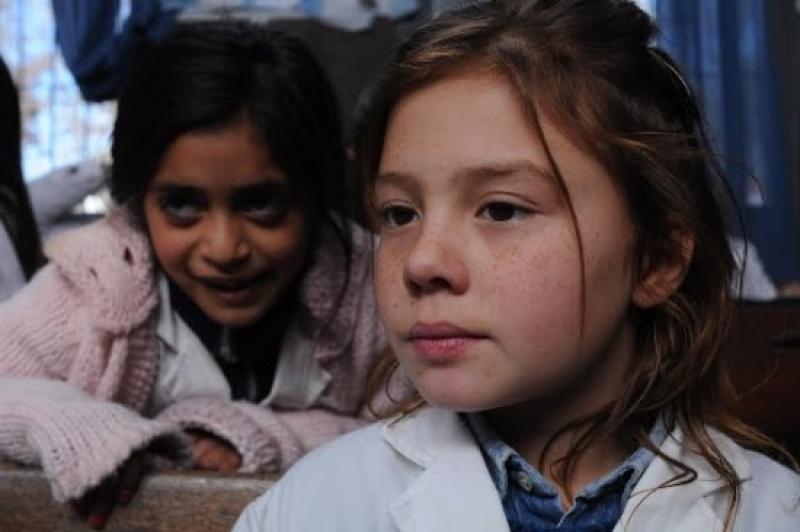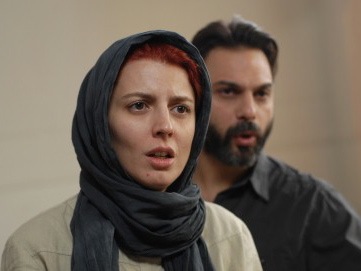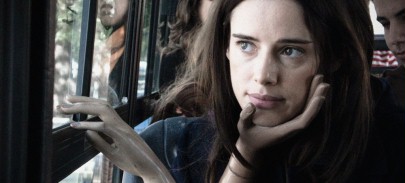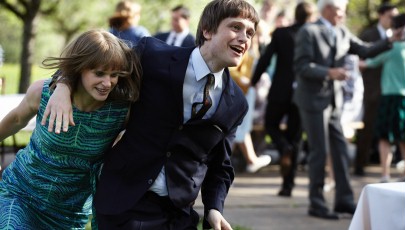theartsdesk in Berlin: The 61st Berlinale | reviews, news & interviews
theartsdesk in Berlin: The 61st Berlinale
theartsdesk in Berlin: The 61st Berlinale
Cold winds and warm stories from all corners in the German capital

Another 400 films, another rush for seats, another biting wind from Vladivostock: the 61st Berlin Film Festival - the Berlinale - has packed ’em in in the centre of town at Potsdamer Platz (mainly) over the last 10 days and hoped to light up the inevitably gloomy middle of February, and almost succeeded. But boy were there some tedious competition films this year.
2011's Golden Bear Jodaieye Nader az Simin ("Nader and Simin: A Separation", the lead actors Leila Hatami and Peyman Moadi pictured below) was a hot contender from the moment the Iranian film hit Berlin. Director Jafar Panahi, nominated for this year's Jury, has just been imprisoned, so understandably a wave of sympathy for this abused country and its beleaguered artists has run through this ever-politically alert festival. Asghar Farhadi's story of family dysfunction, not among the tedious ones, in a society few outsiders have private access to is a natural Berlin winner.
 The Berlinale keeps all doors open, is always fabulously busy and is getting busier. With accreditation one can’t complain (except when, at press conferences, deeply annoying people ask deeply irrelevant questions: one woman this year kept on preluding with embarrassing facts about her therapised life - “My father abused my mother for 45 years” - before baffling the stars and the rest of us with posers dredged up from cultural studies: liebe Berlinale press office, more quality control).
The Berlinale keeps all doors open, is always fabulously busy and is getting busier. With accreditation one can’t complain (except when, at press conferences, deeply annoying people ask deeply irrelevant questions: one woman this year kept on preluding with embarrassing facts about her therapised life - “My father abused my mother for 45 years” - before baffling the stars and the rest of us with posers dredged up from cultural studies: liebe Berlinale press office, more quality control).
So, films from everywhere can be navigated through a rich complex of cinemas, many in fact away from Potsdamer Platz. South America, Russia, Korea and, of course, Iran can be visited with this still self-renovating city, in spite (maybe because) of Siberian cold, remaining almost as stimulating as anything on screen.
Topological themes always congregate, I don’t know why - simply the accident of the earth shining through 400 flicks? - but this year for me it was Argentina. Let’s kick off with one of the worst. Un mundo misterioso (“A Mysterious World”), by Rodrigo Moreno, is an idiotic experiment in formlessness, aimlessness, vacuity. An absent-minded youngish man in Buenos Aires gets shoved out of bed, post-coitally, by his girlfriend, moves to a hotel, tries to pick up, or get picked up by, a couple of other feckless females, fails to arrive at a New Year’s party in Montevideo, has his choking Renault 6 repaired, then takes a drink and eats with the mechanic.
That’s it. I didn’t survive to the end (gave up when a solo flautist on the hotel’s TV produced the sound of an oboe). The film seemed to have ended before it’d begun. Moreno asks us to admire art when all that can be truly admired are, occasionally, dusty cameos of downtown Buenos Aires and interiors of its colectivos (BA’s marvellous antique buses). It’s hard to know why such drippiness ends up in the competition. One needs vastly more from a movie than geography and public transport, even one with a strong spirit of place. Cut to early in the festival and another Argentina-based (Mexican-made) film, El premio (“The Prize”).
One of my favourites, this film’s first hour managed to remove perhaps a quarter, maybe more, of the huge Berlinale Palast. In truth, only being wedged into the middle of a row stopped me fleeing too. The start is an agonisingly amorphous, nerve-testing portrait of a tense mother-daughter relationship in a collapsed seaside cabin, set in the late 1970s. The little girl Ceci (Paula Galinelli Hertzog) is maybe six or seven, the mother Lucía (Laura Agorreca) in her thirties.
I’m glad I stuck with it. Lucía is in hiding from the military in Buenos Aires, who are holding her husband. No concrete story is offered but slowly, very slowly, it becomes clear that Lucía is in mortal danger - Argentina’s Dirty War junta (1976-83) was expert, lest we forget, in the genital torture and ejecting from helicopters into the sea of thousands of young leftwingers - and, taking part in a school-essay competition organised by the army, Ceci’s description of soldiers as killers threatens to expose Lucía’s whereabouts. When Lucía, frogmarching Ceci to her teacher’s house at night to correct the truth, says to her daughter, who asks if she should write the same again, “No! The opposite!”, we realise that this grainy, unglamorous film is about much, much more than a little girl mucking around with a schoolfriend, an irritated mother and the sea (lots of sea).
El premio is about fear, innocence, mortal disclosure and fascism. It's unlikely to grace your local Vue, and even if it does you’re not going to suffer it on a popcorn Friday night out. But Paula Markowitch, the much-praised writer of Lake Tahoe, has directed something, in the end, of bewitching watchability, certainly in the extraordinary little Ms Hertzog’s performance, and also of haunting urgency.
 Medianeras, in the festival’s Panorama section, is a tale of two porteño misfits (played by Javier Drolas and the deliciously compelling Pilar López de Ayala, pictured above) who live close by but fail to meet and fall in love. We want them to fall in love, yet hope not for the obvious. He’s a hypochondriac and looks after a silly white dog; she makes auto-erotic love to her shop-window maquette. Lost urban souls. This really is about Buenos Aires, its lineaments depicted as lovingly as the two characters who flail about in it are irritating and sympathetic. Cliché is somehow avoided, dénouement cleverly postponed until the last 30 seconds and the whole thing is relentlessly charming. It also won a deserved second place in the public’s Panorama vote…
Medianeras, in the festival’s Panorama section, is a tale of two porteño misfits (played by Javier Drolas and the deliciously compelling Pilar López de Ayala, pictured above) who live close by but fail to meet and fall in love. We want them to fall in love, yet hope not for the obvious. He’s a hypochondriac and looks after a silly white dog; she makes auto-erotic love to her shop-window maquette. Lost urban souls. This really is about Buenos Aires, its lineaments depicted as lovingly as the two characters who flail about in it are irritating and sympathetic. Cliché is somehow avoided, dénouement cleverly postponed until the last 30 seconds and the whole thing is relentlessly charming. It also won a deserved second place in the public’s Panorama vote…
Going further off-piste into a small corner of German Perspectives, a section renamed Lola (after Fassbinder’s 1981 classic) rolls out a programme of new German films. One included Das Lied in mir (stupidly translated as “The Day I Was Not Born”: what's wrong with “The Song Within/Inside Me”?) by first-timer Florian Cossen. A German girl (Jessica Schwarz, pictured below right), a budding professional swimmer, is stranded in Buenos Aires and in the airport hears a song in Spanish which breaks her up. A nurse, we later learn, once sang it to her and she doesn’t, in this odd scene, know why.
 It transpires she’s been adopted by Germans working in BA during the dictatorship - her real parents "disappeared" (torture, helicopters) - and she heard the song in her infancy. The film turns on the duplicity in the adoption process of her father, who, because she loses her passport and suddenly seems to be in all sorts of trouble, flies down to be with her. Cossen pursues a sensitively forensic study of displacement and rediscovery, and this, way better than the over-praised The Lives of Others, is my most warmly recommended German film of the last five years.
It transpires she’s been adopted by Germans working in BA during the dictatorship - her real parents "disappeared" (torture, helicopters) - and she heard the song in her infancy. The film turns on the duplicity in the adoption process of her father, who, because she loses her passport and suddenly seems to be in all sorts of trouble, flies down to be with her. Cossen pursues a sensitively forensic study of displacement and rediscovery, and this, way better than the over-praised The Lives of Others, is my most warmly recommended German film of the last five years.
So how do other German films fare in this indubitably prestigious, most lavishly funded jamboree in the Federal Republic’s arts calendar? Middling. Three more in competition can be mentioned and one entirely dismissed. That’s a thing called Schlafkrankheit (“Sleeping Sickness”), a Franco-German-Dutch farrago about a German in Africa who’s gone native and a gay Brussels-born African doctor who visits and is, of course, unable to cope. Mogadon.
Wim Wenders’s Pina, a homage to the late Wuppertal director-choreographer Pina Bausch, is more a homage by Wim Wenders to himself than to a complex artist. Bausch surely cries out for an exploration of critical perspicacity and perspective, not just a series of pretentious montages - in groovy 3D, too (adding nothing, whether or not you’ve seen the works, to bits of The Rite of Spring, Café Müller, Vollmond, all featured here) - or frustratingly mute encounters, faces only, with some her finest performers. If you’ve got Wuppertal stalwarts of the calibre of Lutz Förster, Julie Shanahan and Dominique Mercy, why not let them speak directly and intelligently to camera? No, too obvious. Short-changing, self-regarding, self-appointed Kino-guru Wim Wenders...
Watch the trailer for Pina
Infinitely better is Andres Veiel’s Wer wenn nicht wir (“If Not Us, Who”). This is a tough, narratively taut and quite depressing story, brilliantly acted by August Diehl and Lena Lauzemis (pictured below) in the lead roles, about an idealistic young 1960s publisher, Bernward Vesper, who fell in love, sort of, with an even more idealistic militant, Gudrun Ensslin. Ensslin was of course one third of the tripartite creators of the Rote Armee Fraktion, better known as the Baader-Meinhof gang.
 Prominent and less prominent West Germans in the early 1970s were murdered at their behest, something the recently deceased producer Bernd Eichinger reminded us of, with uncomfortable sexiness, in the 2008 The Baader Meinhof Complex. Veiel’s treatment is much soberer, exploring the strange, distorted trajectories these post-Nazi, highly gifted Germans were victims of in a culture which, then, still hadn’t quite understood what had hit it 25 years or so before. The wretched Vesper became an acid head and committed suicide in 1971 (as did Ensslin and Baader, in prison, six years later); what Veiel evokes so well - the earlier film didn’t - is the trauma contemporary Germany still feels about these troubling, wasted dreamers.
Prominent and less prominent West Germans in the early 1970s were murdered at their behest, something the recently deceased producer Bernd Eichinger reminded us of, with uncomfortable sexiness, in the 2008 The Baader Meinhof Complex. Veiel’s treatment is much soberer, exploring the strange, distorted trajectories these post-Nazi, highly gifted Germans were victims of in a culture which, then, still hadn’t quite understood what had hit it 25 years or so before. The wretched Vesper became an acid head and committed suicide in 1971 (as did Ensslin and Baader, in prison, six years later); what Veiel evokes so well - the earlier film didn’t - is the trauma contemporary Germany still feels about these troubling, wasted dreamers.
In the English-language corner, there was the première of Ralph Fiennes’s Coriolanus, which again - rather like El premio - will have no one hopping out of his seat reassured about the world. The first half-hour is a computer war game of eye-bludgeoning intensity. Fiennes stalks through the rest of it like an iambic Indiana Jones. Vanessa Redgrave puts in a predictably driven performance (almost stealing the movie) as the vacillating warrior's mother Volumnia. Its main problem is that it can't decide whether it's classical drama, violently filleted as it is, or mainstream TV; but recognisably a Shakespeare play it certainly hasn't remained.
Two US offerings, meanwhile, Margin Call (director JC Chandor: starring Kevin Spacey, Paul Bettany and Jeremy Irons), based on the Lehman Bros' collapse, and Miranda July's kooky half-rom-com, The Future, are precisely entertaining but feel untransmuted up against the Iranian winner, El premio and the impressively uncompromising - no happy ending - German terrorist movie. Look around, and across all sections: the Berlinale never fails to test.
Add comment
The future of Arts Journalism
You can stop theartsdesk.com closing!
We urgently need financing to survive. Our fundraising drive has thus far raised £49,000 but we need to reach £100,000 or we will be forced to close. Please contribute here: https://gofund.me/c3f6033d
And if you can forward this information to anyone who might assist, we’d be grateful.

Subscribe to theartsdesk.com
Thank you for continuing to read our work on theartsdesk.com. For unlimited access to every article in its entirety, including our archive of more than 15,000 pieces, we're asking for £5 per month or £40 per year. We feel it's a very good deal, and hope you do too.
To take a subscription now simply click here.
And if you're looking for that extra gift for a friend or family member, why not treat them to a theartsdesk.com gift subscription?
more Film
 London Film Festival 2025 - crime, punishment, pop stars and shrinks
Daniel Craig investigates, Jodie Foster speaks French and Colin Farrell has a gambling habit
London Film Festival 2025 - crime, punishment, pop stars and shrinks
Daniel Craig investigates, Jodie Foster speaks French and Colin Farrell has a gambling habit
 I Swear review - taking stock of Tourette's
A sharp and moving tale of cuss-words and tics
I Swear review - taking stock of Tourette's
A sharp and moving tale of cuss-words and tics
 A House of Dynamite review - the final countdown
Kathryn Bigelow's cautionary tale sets the nuclear clock ticking again
A House of Dynamite review - the final countdown
Kathryn Bigelow's cautionary tale sets the nuclear clock ticking again
 theartsdesk Q&A: Idris Elba on playing a US President faced with a missile crisis in 'A House of Dynamite'
The star talks about Presidential decision-making when millions of lives are imperilled
theartsdesk Q&A: Idris Elba on playing a US President faced with a missile crisis in 'A House of Dynamite'
The star talks about Presidential decision-making when millions of lives are imperilled
 Urchin review - superb homeless drama
Frank Dillane gives a star-making turn in Harris Dickinson’s impressive directorial debut
Urchin review - superb homeless drama
Frank Dillane gives a star-making turn in Harris Dickinson’s impressive directorial debut
 Mr Blake at Your Service review - John Malkovich in unlikely role as an English butler
Weird comedy directed by novelist Gilles Legardinier
Mr Blake at Your Service review - John Malkovich in unlikely role as an English butler
Weird comedy directed by novelist Gilles Legardinier
 Don't Let's Go to the Dogs Tonight review - vivid adaptation of a memoir about a Rhodesian childhood
Embeth Davidtz delivers an impressive directing debut and an exceptional child star
Don't Let's Go to the Dogs Tonight review - vivid adaptation of a memoir about a Rhodesian childhood
Embeth Davidtz delivers an impressive directing debut and an exceptional child star
 One Battle After Another review - Paul Thomas Anderson satirises America's culture wars
Leonardo DiCaprio, Teyana Taylor, and Sean Penn star in a rollercoasting political thriller
One Battle After Another review - Paul Thomas Anderson satirises America's culture wars
Leonardo DiCaprio, Teyana Taylor, and Sean Penn star in a rollercoasting political thriller
 Steve review - educator in crisis
Cillian Murphy excels as a troubled headmaster working with delinquent boys
Steve review - educator in crisis
Cillian Murphy excels as a troubled headmaster working with delinquent boys
 Can I get a Witness? review - time to die before you get old
Ann Marie Fleming directs Sandra Oh in dystopian fantasy that fails to ignite
Can I get a Witness? review - time to die before you get old
Ann Marie Fleming directs Sandra Oh in dystopian fantasy that fails to ignite
 Happyend review - the kids are never alright
In this futuristic blackboard jungle everything is a bit too manicured
Happyend review - the kids are never alright
In this futuristic blackboard jungle everything is a bit too manicured

Comments
...